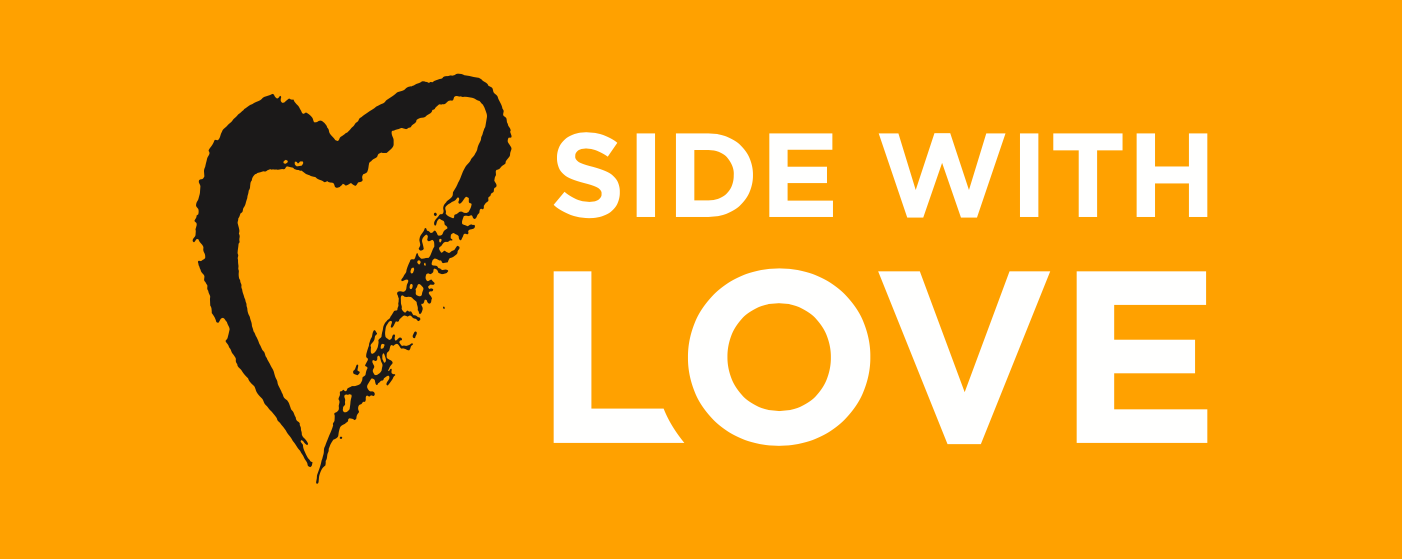Since its inception, Standing on the Side of Love (SSL) received feedback from disability rights activists within Unitarian Universalism about the exclusionary and ableist language of “standing”.
Over the last nine years, the vision of our work has shifted and transformed from working on issues of dismantling white supremacy, LGBTQ equity, addressing anti-Muslim bigotry, immigration justice and more. We find ourselves now meeting the shifting political moment, providing behind the scenes support in moments of uprising, leveraging resources and offering spiritual sustenance. During this time, some UUs have already adapted our name to remove the word “standing.” We have seen people change t-shirts, banners, and the song that inspired the campaign’s name. Pushed forward by a Responsive Resolution at GA 2017, we committed to changing the name because of its history of injury and exclusion and to honor and respond to feedback by making the shift. Staff from the UUA, in collaboration with the authors of the Responsive Resolution, EqUUal Access and other stakeholders, worked on the name change proposal.
We are so excited to share with you that our new name, our new imagining, as the Responsive Resolution so beautifully called for, is Side with Love! You can also watch a video about our announcement here. Check out EqUUal Access' take on the shift here.
Side with Love is an invitation and a challenge. It is an opportunity to firmly name what we are for and against. To recognize that as we seek to embody universalism we commit to resisting oppression. A recognition that in many moments there are two sides: one of love and one of oppression and violence. We are always bound up in messy webs alongside even those who perpetrate hate. And daily, we choose whether we are siding with love, freedom, liberation, reparations, and integrity or whether we are siding with the violence of white supremacy, patriarchy, ableism and heterosexism.
Side with Love raises provocative spiritual questions including “When have I sided with love? When have I shirked siding with love? When have I chosen the side of comfort, apathy, despair, and acquiescence instead of the side of faith, risk, sacrifice, and resistance?”
Side with Love is an opportunity to expand and deepen our understandings of the ways ableism shows up within the justice and spiritual communities we participate in, create and cultivate. Over the last year, we supported organizing to stop the repeal of the Affordable Care Act, working with members from disability rights and housing justice organizations like ADAPT and Housing Works. We hope to continue to build with organizations within our faith working on these issues. We also invite you to engage the Accessibility and Inclusion Ministry Program, EqUUal Access, and Worship Web, and the many leaders within our faith doing this work and offering powerful resources for this journey.
Rev. Helen McFadyen, the Accessibility and Inclusion Ministry (AIM) Administrator offers:
“To me, the process of changing the SSL name to SwL is a perfect example of our Unitarian Universalist theology - a non-static, living tradition which encourages questioning and examining truths, sees change as inevitable, and values the wisdom of lived experience. Changing the message will require both strength and vulnerability: the vulnerability to examine past choices and their impact, and the strength to act on the surfacing reality... and commitment to engage in the process.
This transition harkens to the emergent nature of our tradition. For a time, we lacked awareness, and consultation, and the input of people with disabilities. As leaders and members of our denomination became increasingly aware of the message’s negative impact, we also saw willingness to do something, to change instead of challenge or deny, and agreement to engage in conversations around it.
This is a timely opportunity for Unitarian Universalists to learn what ableism is, to see how it is manifest in society, in our own behaviour and relationships, and in our congregations. More importantly, in becoming aware of this as a justice issue, I think we are being called to engage in something very important and transformative.
Unitarian Universalists have been focused on important dialogue and learning opportunities on racism, white supremacy culture, and the role privilege has in perpetuating exclusion and oppression. Changing the message will open new conversations that we can’t ignore or relegate to a more convenient time; ableism impacts Unitarian Universalists with disabilities, our congregations, and our larger communities. It’s not a matter of prioritizing one “ism” over another but of leaning into multiple experiences simultaneously, because we simply must. It may be a bit discomforting for some. But our principles and values and interdependence as Unitarian Universalists call us to Love and Justice.”
Florence Reece, a white union organizer, wrote “Which Side Are You On?” in the 1930s amidst a violent struggle for the rights of miners in Harlan County Kentucky. Versions of it have been sung in the streets ever since, most recently renewed and updated by the Dream Defenders, BYP100 and other organizers in the Movement for Black Lives.
They say in Harlan County
There are no neutrals there
Which side are you on my people? Which side are you on?
We answer that question with our lives. May we Side with Love.
As we live into these shifts, we offer some frequently asked questions for your information. We believe we have the strength, courage and power to commit to Side with Love.
Onward,
Rev. Elizabeth Nguyen, Strategic Advisor, Side with Love (right)
Nora Rasman, Campaign Manager, Side with Love (left)


